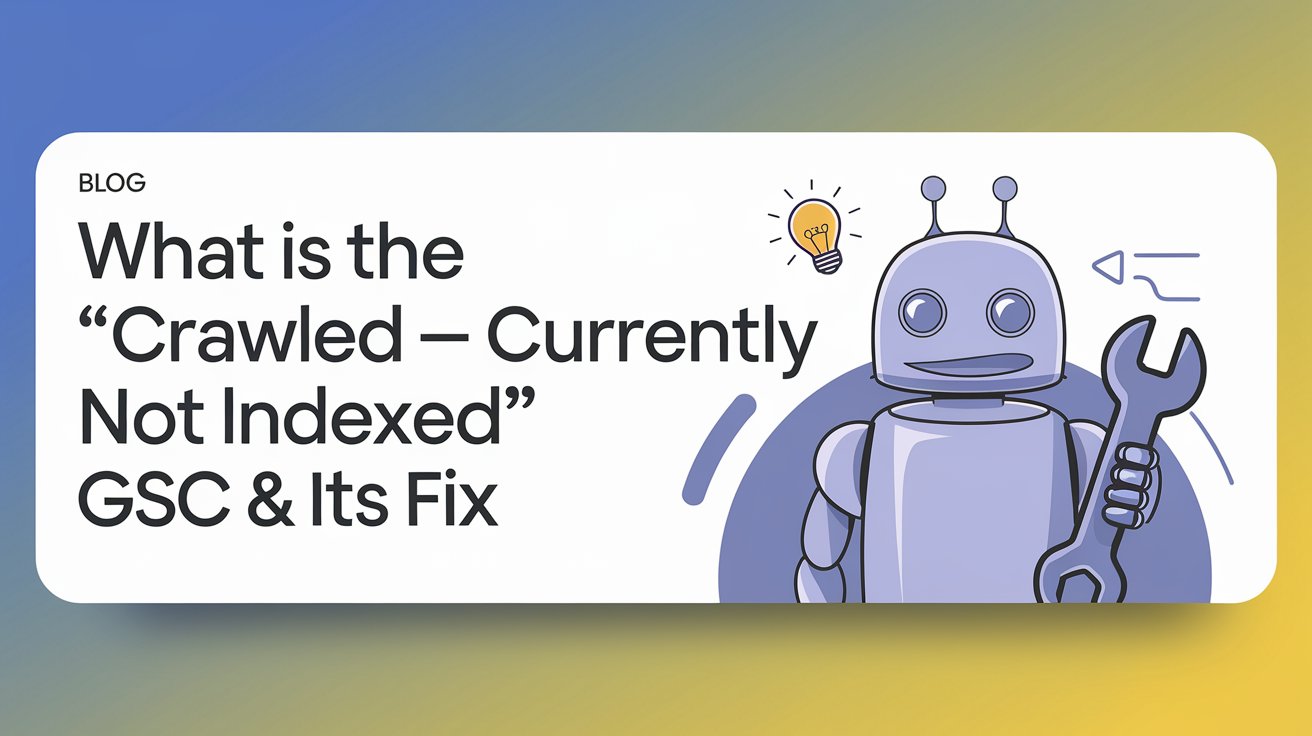Among the many complexities surrounding search engine optimization, Google Search Console has become an integral tool. From the wide range of information that it provides, numerous website owners and SEO professionals get help improving their respective online presences. One common problem people find with GSC is the “Crawled-Currently Not Indexed” status. This can be confusing, especially for any business relying on visibility. In this post, we shall delve into what this issue means, why it happens, how you can effectively fix it and when to take help from a SEO Company Spain.
What does “Crawled – Currently Not Indexed” mean?
If you see “Crawled – Currently Not Indexed” status in the Google Search Console, that means although Googlebot successfully crawled the page, for one reason or another, Google decided not to include it into its search index. The status will be found in the Index Coverage report, which reflects how Google is processing your website’s pages.
This would mean that it does not appear on any search results pages, thereby directly impacting the visibility of your site, hence generally affecting your business. In this regard, for an SEO company in Spain it is important to ensure that all pages of value get indexed as part of enhancing their client’s online visibility.
Why Does the “Crawled – Currently Not Indexed” Problem Arise?
There could be a variety of reasons why Google wouldn’t index a page after crawling. The most common causes include:
1. Low-Quality Content: Google likes high-quality, relevant content. If your page is thin or low in content, or it doesn’t add value to users, then Google may see no need to index it.
2. Duplicate Content: If the content of your page closely resembles any other page on your website or even on other sites, then Google may decide to index just one of those pages and exclude the rest.
3. Crawl Budget Issues: If your website is large, then Google’s crawl budget could be an issue. What this essentially means is that Googlebot has a certain amount of time for crawling your site, and if it doesn’t find the content very important, then it might skip indexing certain pages.
4. Indexing Problems: Sometimes, the problem may be with your site’s technical issues. It could be due to the wrong usage of meta tags like “noindex,” errors in robots.txt, or server errors during crawling time.
5. Content Under Review: Probably, Google still needs some more time with your content. New pages and updated ones do not show up instantly; Google takes its due time to analyze whether the content is relevant for its users or not.
Basically, for any Spanish SEO agency operating either with local or international clients, understanding these reasons is key to diagnosing and solving indexing issues.
How to Resolve the Problem of “Crawled – Currently Not Indexed”
The solution to the problem of “Crawled – Currently Not Indexed” requires a combination of content optimization, technical SEO, and strategic monitoring in which a professional SEO company Spain can help. What follows is a practical way through which one can try to resolve this problem:
1. Improve Quality of Content
Quality of your content: First of all, you need to check the quality of your content. Every page should bring some unique, useful, and purposeful information that is not found on any other page. Avoid ‘thin’ content without user value. Development of time-consuming, in-depth, appealingly written, and well-structured contents answering specific user questions is highly recommended.
For instance, an SEO company Spain may focus on creating detailed guides to local SEO strategies, case studies, or insights peculiar to the Spanish market. Good-quality content is more likely to be indexed well and rank well.
2. Check for Duplicate Content
Get through with finding duplicate content using tools like Copyscape, Siteliner, or GSC’s own “Coverage” report. If any duplicates are detected, merge content on one authoritative page or use canonical tags to let Google know which page to index.
For instance, if there is an SEO company Spain, Switch2us, that has a number of thin content pages covering similar keyword phrases, this could be merged into one solid page to help both with indexing and ranking.
3. Optimize Crawl Budget
Make sure that Googlebot is spending time on your most important pages within the crawl budget of your site. You will be able to do this by:
– Blocking low-value pages, which include your admin pages or outdated content, using robots.txt.
– Applying internal linking effectively in order for Googlebot to find the most important pages.
– Removing or no-indexing low value pages like tag pages, author archives, or thin content pages.
A well-optimized crawl budget ensures that all the important pages on your website are crawled and indexed with Google efficiently.
4. Fix Technical Problems
Technical SEO plays a major role in crawling and indexing your site. Keep an eye on several technical problems, which may be the reason for Google’s not indexing your pages.
– Make sure you don’t have any accidental “noindex” tags on pages you want indexed.
– Check your robots.txt file to make sure you are not blocking any important pages.
– Run individual URLs through GSC’s URL Inspection Tool to identify possible indexing issues.
An SEO company Spain should, from time to time, conduct such technical issues audits for their clients’ sites to make sure those get resolved for the best performance of search results.
5. Submit Pages for Indexing
If you have recently updated any page, or have created new content, you are free to ask for indexing manually via GSC. You should access the “URL Inspection Tool” and submit your URL directly to Google. Doing this won’t guarantee that the indexing happens immediately, but for sure will try to speed up the process a little.
For a Spanish SEO agency, topping the list with manual indexing requests-actually, for high-priority pages-they will be able to ensure indexing of important content sooner.
6. Monitor and Adjust
The nature of solving “Crawled – Currently Not Indexed” problems is not something to be done once but requires regular monitoring. Periodically check GSC in order to know which pages are not indexed and for what reasons. Constantly make adjustments to both your content strategy and technical settings based on these findings.
A SEO company in Spain that places a greater emphasis on ongoing monitoring and optimization will be best positioned to continue to see solid visibility in the search results.
Conclusion
This is one of the most frequent problems in the SEO landscape, but it can be managed with a strategic approach. Pay attention to the quality of the content you offer, eradicate duplicate content issues, optimize your crawl budget, fix technical problems, and monitor how your site is performing consistently-the probability of all valuable pages being indexed will increase manifold.
For businesses partnered with a leading SEO company in Spain, Switch2us, addressing these issues is imperative on both fronts to make sure continuity and more of your site’s visibility in search results are ensured. Since the digital world changes with each passing day, staying updated and agile with the indexing issues will also persist as a cornerstone of successful SEO strategies.


